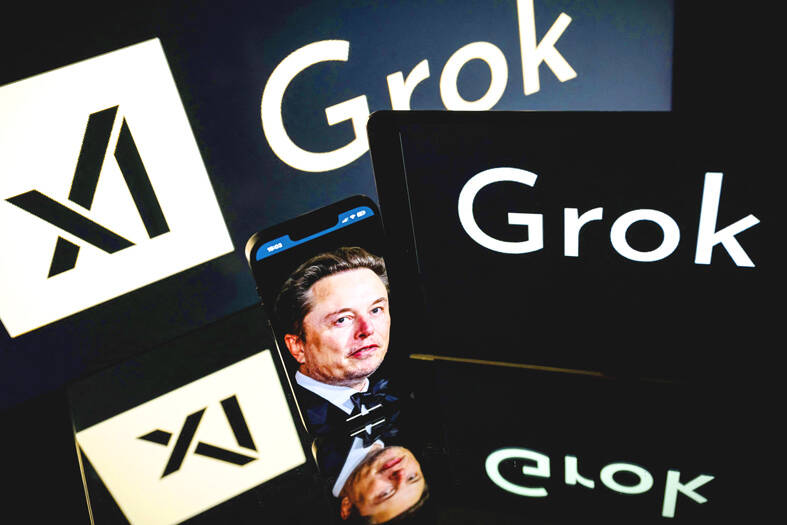Elon Musk said that his artificial intelligence (AI) start-up would make an app dedicated to kid-friendly content and call it “Baby Grok,” after xAI on Monday last week announced the launch of a “Grok for Government” service, following a similar initiative by OpenAI.
The billionaire did not provide further details on Baby Grok in a post on X.
Earlier this month, xAI rolled out chatbot Grok 4 just months after releasing its previous iteration, underscoring the frenetic pace of AI development.

Photo: AFP
Grok 4 AI model is “smarter than almost all graduate students, in all disciplines, simultaneously,” Musk claimed in a livestream on July 9.
The company also said that its new AI system scores higher on certain benchmarks than OpenAI and other leading competitors, and the chatbot would be coming to Tesla Inc vehicles soon.
The integration into Tesla vehicles suggests an expanded relationship between the electric-vehicle maker and xAI, something that some Tesla investors have called for as its sales have slumped.
However, the release of the latest chatbot version also came after the bot shared multiple anti-Semitic comments and praise for Adolf Hitler on X that drew widespread condemnation.
Days later, X chief executive officer Linda Yaccarino announced her resignation, creating a leadership hole atop the social network.

Sweeping policy changes under US Secretary of Health and Human Services Robert F. Kennedy Jr are having a chilling effect on vaccine makers as anti-vaccine rhetoric has turned into concrete changes in inoculation schedules and recommendations, investors and executives said. The administration of US President Donald Trump has in the past year upended vaccine recommendations, with the country last month ending its longstanding guidance that all children receive inoculations against flu, hepatitis A and other diseases. The unprecedented changes have led to diminished vaccine usage, hurt the investment case for some biotechs, and created a drag that would likely dent revenues and

Global semiconductor stocks advanced yesterday, as comments by Nvidia Corp chief executive officer Jensen Huang (黃仁勳) at Davos, Switzerland, helped reinforce investor enthusiasm for artificial intelligence (AI). Samsung Electronics Co gained as much as 5 percent to an all-time high, helping drive South Korea’s benchmark KOSPI above 5,000 for the first time. That came after the Philadelphia Semiconductor Index rose more than 3 percent to a fresh record on Wednesday, with a boost from Nvidia. The gains came amid broad risk-on trade after US President Donald Trump withdrew his threat of tariffs on some European nations over backing for Greenland. Huang further

CULPRITS: Factors that affected the slip included falling global crude oil prices, wait-and-see consumer attitudes due to US tariffs and a different Lunar New Year holiday schedule Taiwan’s retail sales ended a nine-year growth streak last year, slipping 0.2 percent from a year earlier as uncertainty over US tariff policies affected demand for durable goods, data released on Friday by the Ministry of Economic Affairs showed. Last year’s retail sales totaled NT$4.84 trillion (US$153.27 billion), down about NT$9.5 billion, or 0.2 percent, from 2024. Despite the decline, the figure was still the second-highest annual sales total on record. Ministry statistics department deputy head Chen Yu-fang (陳玉芳) said sales of cars, motorcycles and related products, which accounted for 17.4 percent of total retail rales last year, fell NT$68.1 billion, or

HSBC Bank Taiwan Ltd (匯豐台灣商銀) and the Taiwan High Prosecutors Office recently signed a memorandum of understanding (MOU) to enhance cooperation on the suspicious transaction analysis mechanism. This landmark agreement makes HSBC the first foreign bank in Taiwan to establish such a partnership with the High Prosecutors Office, underscoring its commitment to active anti-fraud initiatives, financial inclusion, and the “Treating Customers Fairly” principle. Through this deep public-private collaboration, both parties aim to co-create a secure financial ecosystem via early warning detection and precise fraud prevention technologies. At the signing ceremony, HSBC Taiwan CEO and head of banking Adam Chen (陳志堅)